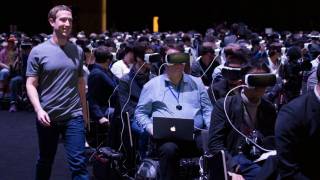Who owns your face? Weak laws give power to Facebook
Source: fortune.com
In a fateful moment for privacy, Facebook’s “Moments” uses facial recognition to expose where people went and who they were with.
What a bad week for privacy. Consumer watchdogs gave up on government talks over facial recognition software after industry groups appeared to reject even basic restrictions on face-scanning. Meanwhile, Facebook rolled out a new service called “Moments” that expands the use of the company’s powerful “faceprint” technology.
This doesn’t mean the privacy apocalypse is upon us; for now least, the Facebook “Moments” tool is just one more creepy-but-useful social media innovation. But if loss of liberty happens gradually, June of 2015 could be a watershed we look back on with regret. It marks a time when we took new steps towards accepting the use of our very faces as a universal ID card – without deciding on the rules for using it.
Facebook’s powerful, dangerous faceprint tool
Your face is like your fingerprint: It’s a set of identifying markers that are distinct to you and, short of major surgery, can’t be erased. In recent years, the FBI and others have amassed mass databases of “faceprints,” but Facebook has the biggest, and is best at using them. (“Faceprint” is a generic term, but one that has been adopted by online dictionaries and major media outlets).
My colleague Stacey Higginbotham this week described the remarkable feats of artificial intelligence that let Facebook FB 1.36% teach computers to “see” the same face across hundreds of millions of photographs. That AI power is what drives Facebook’s existing “tag” feature, which shows users a photo and a prompt like “Is this Jill?” (if the user says yes, Jill will typically be “tagged” when others see the photo).
That tag feature, notably, is not available in many countries. Regulators in the European Union and Canada, specifically, have found it to be intrusive so Facebook does not turn it on. Given that reaction, it’s unlikely those countries will be okay with the company’s new “Moments” feature either.
If you’re unfamiliar, Moments is one of Facebook’s sister apps for mobile devices. It works by burrowing into all the photos on your camera, and sorting them into discrete temporal events – that party, that bike trip, that office function – to create “Moments.” The app then tags everyone it recognizes by comparing the faces in the photos to existing Facebook friends (your “social graph” in tech parlance), and invites you to share the resulting “Moment” with everyone tagged in the photo.
Facebook Moments
The idea is a good one. As Facebook points out, it could eliminate the need to take group shots on multiple cell phones, and it creates a quick and easy way to share pics of an event with those who were there. The catch, however, is that the whole thing turns on Facebook’s facial recognition technology in a way that requires everyone to accept the use of their face as a type of ID badge.
Think of the implications: Facebook already has detailed biographical data about each of its users, and now it is using faces to create an archive of where they were and who they were with. Here is how the Privacy Commissioner of Canada explains what could happen (my emphasis):
"Of significant privacy concern is the fact that Facebook has the ability to combine facial biometric data with extensive information about users, including biographic data, location data, and associations with “friends.” […]
The availability of cheap facial recognition for the masses may have the effect of normalizing surveillance over time. We are not yet at the point where we can take pictures of people on the street with our smartphones, identify them, and gain access to information about them. However, this reality may not be too far off
That warning is from 2013 and relates to Facebook’s existing “tag” technology. The arrival of Moments, then, doesn’t introduce a new privacy risk, but expands an existing one: It normalizes the use of facial technology and makes it easier than ever to quickly track others’ whereabouts and the company they keep – all without their permission, and on the internet.
In the worst case scenario, the technology could one day be used to compile and publish moments outside an AIDS treatment center, an abortion clinic, a gay bar, a church, a strip club, a mosque, a union meeting and so on.
Weak laws
It’s not fair to blame Facebook for every potential abuses of facial recognition software. After all, lots of other outfits are using it too, including Microsoft, Google, casinos, night clubs and the Department of Homeland Security. Meanwhile, the technology has many benefits.
Facial recognition not only offers a new tool for law enforcement and border security, but could bring convenience and safety to consumers too. Imagine, for instance, using nothing but your face to log-in to your computer, open your front door or control every sensor in your house.
Source: fortune.com






















